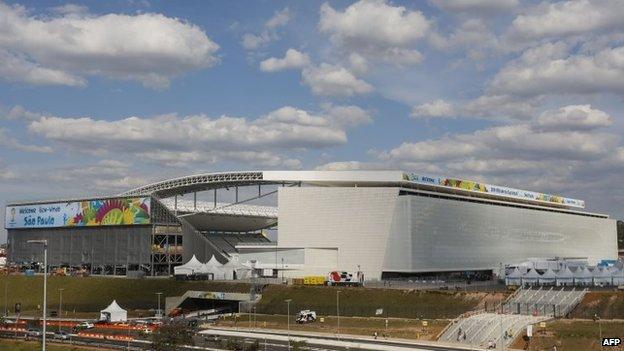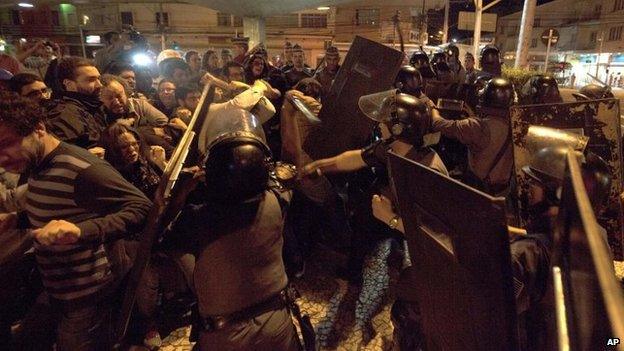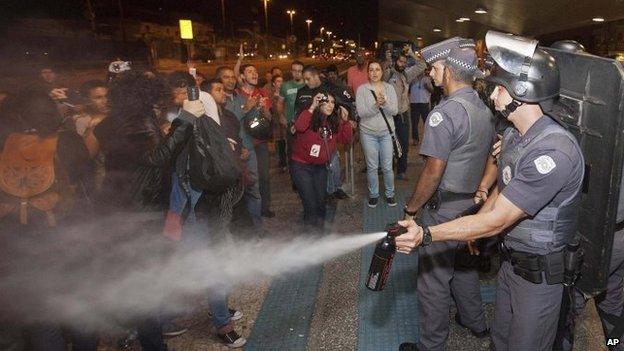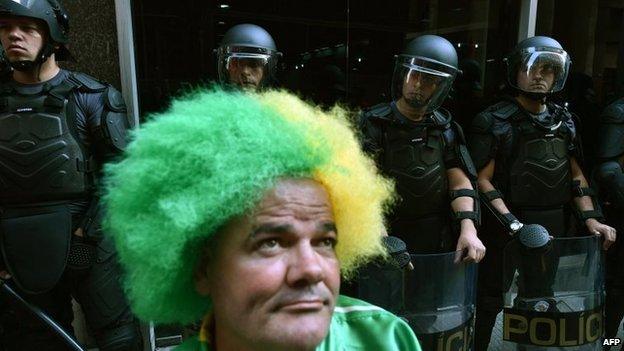Sao Paulo metro strike suspended for two days
- Published
Katy Watson reports on the metro strike that has caused widespread misery for commuters in Brazil's biggest city
Metro workers in Brazil's largest city, Sao Paulo, have suspended a strike over pay to allow for negotiations.
The five-day stoppage had caused traffic chaos in one of the world's most congested cities just days ahead of the football World Cup.
The union warned that the strike would resume on Thursday - when Sao Paulo hosts the opening match - if its demands are not matched.
A strike would make it hard for fans to reach the stadium on Thursday.
Threat of dismissal
Arena de Sao Paulo, where the tournament kicks off with a match between Brazil and Croatia, is located on the city's outskirts and a metro strike could cause major disruption.

Arena de Sao Paulo will host the opening match between Brazil and Croatia on Thursday
A spokeswoman for the union said they would meet again on Wednesday to consider their position but insisted that staff threatened with dismissal would have to be reinstated.
The stoppage began on Thursday as part of a wage dispute.
The state metro company offered workers an 8.8% rise but they are insisting on a 12.2% increase.
A court ordered them to return to work and when union members disobeyed, the company sent out dozens of dismissal notices to staff alleged to have been involved in strike-related disturbances.
Sao Paulo Governor Geraldo Alckmin on Monday insisted the dismissals were irreversible.
Clashes
On Monday riot police clashed with hundreds of striking workers at Ana Rosa metro station.

Members of the metro union and police clashed in the early hours of Monday morning

Police used tear gas and pepper spray to disperse the protesters
The BBC's Katy Watson, who was at the scene, said authorities were not taking any chances, flying helicopters overhead and throwing tear gas to disperse protesters.
Katy Watson in Sao Paulo: "Social movements have come together to complain about the government"
Union President Altino Prazeres said that ruining the World Cup was not the strikers' intention and that they were willing to negotiate.
"I love soccer! I support our national team,'' he told the Associated Press news agency.
Our correspondent says there is a great deal of bitterness about the money spent on the tournament among the workers.
Last year more than a million people took to the streets of major Brazilian cities to vent their anger at what they see as excessive spending on the World Cup and the 2016 Olympics in Rio.

Riot police were out in force on Monday to disperse protesters
The government is keen to prevent a repeat of some of the violence seen at those protests.
Brazilian President Dilma Rousseff has said she would not allow violent demonstrations to mar the World Cup.
Thousands of extra police and soldiers will be deployed to ensure the matches get under way smoothly.